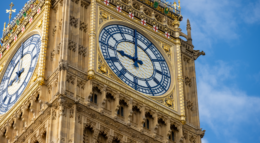
Billy Bragg’s Brexit Confusion
Sean Walsh believes the case for leaving the EU is at its strongest when it's made in ways that transcend simple economics.
I'm not a huge fan of The Daily Politics unless it's presented by Andrew Neil, but Billy Bragg was the guest one-day last week, so I decided to give it a look. I'm a fan of the singer-songwriter-activist not because I share his political views (I don't) but because he is an articulate defender of a sort of patriotic leftism.
But the High Priests and Priestesses of Brexit in Name Only must have got to him. This is the only explanation for his repetition on air of the Remainer mantra that "leaving the customs union was not on the ballot paper". No, Billy, it wasn't, not explicitly. It was, it should be said, explicitly a commitment of the election manifestos of both main parties. But the referendum question was not "do you vote to leave the European Union and all the institutions that are politically constitutive of the European Union with all the attendant chaos and slaughter of the firstborn; or would you prefer to remain and eat apple pie?". On the other hand, most of us get the gist: people voted to leave the EU and if there are political structures of the EU that are essential to its character and identity then we voted also to extricate ourselves from those. The "customs union" (which is really a cartel) is such a structure. And it is absurd to attempt to leave the EU while remaining implicated in the structures which define it. "You are thirsty, and I respect absolutely your right to ask for a glass of water, but you didn't say you wanted H2O". To stay in the customs union would be to stay in the EU. And that option most emphatically was on the referendum ballot.
In other ways, Bragg seems to get it. Later in the programme, there was a discussion of what we now are expected to refer to as Enoch Powell's infamous "Rivers of Blood" speech. Bragg made the very salient point here that decent national feeling involves an attachment to place. This, it seems to me, goes to the heart of the Brexit issue. Our gentle patriotism is formed over centuries of local dispute, resolution and reconciliation which are the basis of our common law. The EU has a very different view of the nature of the law: that it is teleological in character and is available not so much for the settling of disputes as for the service of clearly political ends. And this "gentle patriotism" stands athwart an EU which is a political project masquerading as an economic one and an attempt to grow a state from a set of approved political mechanisms (when in the normal order of things, it is the other way around).
There are those who sneer at any form of patriotism. It is an obviously contingent fact, they argue, where you were born. It is, therefore, irrational to form a preference for this country over that based on this accident of birth. But this is to make the mistake of reducing all our obligations to obligations of contract. There are legitimate forms of obligation which are non-contractual and which are given, obligations arising from membership of family being the paradigmatic example. That these obligations are felt rather than chosen does not make them irrational. It may well be that these non-contractual obligations and attachments – to place, to family, to country – generate the social and political space that make freedom of choice possible in the first place.
"What ish my nation?" asks MacMorris in Henry V. I remember hearing a paper given by the Marxist philosopher David Archard, many years ago, in which he argued that nationhood is beyond definition in terms of a set of necessary and sufficient conditions. He drew the conclusion that to be beyond definition in this sense is to be somehow unreal. A more plausible conclusion might be that nationhood and the allegiances it grounds are irreducible to categories of economics, geography, law or history – that they are an admixture of these things and are all the more real for that.
This is why the economic case (such as it is) for remaining within the EU misses the point. The case for leaving the EU is at its strongest when it is made in ways that have nothing to do with economics. To the oft-repeated assertion that "people did not vote to be poorer" the correct reply might be to shrug and say that "they did if it meant they'd be freer".
As for Billy Bragg, it is I suppose dispiriting when somebody as smart as he undoubtedly is falls victim to Remainer groupthink. But then the Grieve-Soubry-Clarke meme can colonise even the sharpest of minds. And Bragg will always be the organiser of the 2005 Bob Dylan tribute concert at the Barbican at which KT Tunstall offered a jaw-droppingly good version of Tangled Up In Blue. I can forgive him almost anything for that.













